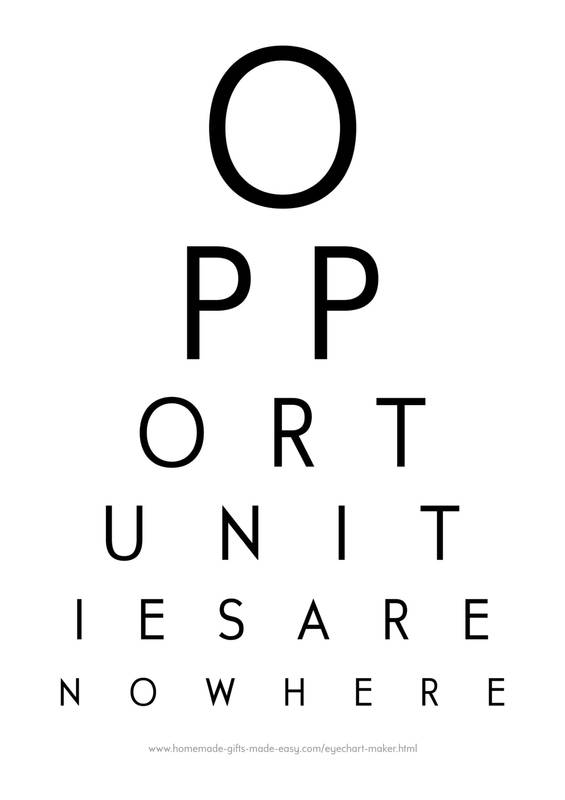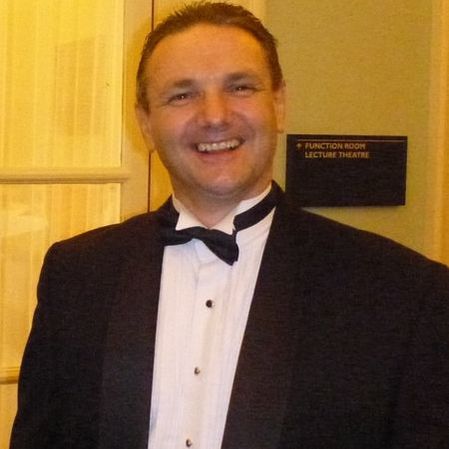The Thursday Thesis - 30/03/2017
“The Power of Focus, and a Brand-New Lens” It’s a funny thing, you know, this life business. One day you think it’s all over and done, that all the good stuff has been taken, and the next day you stumble on something that opens your eyes up to new possibilities. Of course, the possibilities have been waiting around, waiting to be discovered, for a while - but you weren’t ready to see them yesterday. Every time we learn a new idea, skill, technique or approach we can use it to look at the World in a new way: sort-of like a lens. Not only can our new “lens” broaden our field of view, it can also sharpen our ability to focus. And the more lenses we have, the more problems we can see a way through. We may test a number of lenses on a problem or situation, but – with time and persistence – we’ll suddenly find that everything snaps into sharp focus... As I’ve learned more about the possibilities open to me as an entrepreneur I’ve begun to see opportunity everywhere. It’s crazy – you learn a new thing and “boom!” you almost fall over the possibilities you can suddenly see. Now is the time to focus on what is most important, to keep your ferocious attention on the Big Things that matter most to you, remembering the reason why you want to do them. Keep on learning, keep on growing; try out a new lens and see if it changes your point of view. Does the eye chart say “OPPORTUNITIES ARE NOWHERE” OR “OPPORTUNITIES ARE NOW HERE”? No Peeking! Please Like and Share The Thursday Thesis with your friends, family, visiting life-forms and anyone else. I’d love to hear your comments, along with any ideas you’d care to hurl at me. [email protected]
1 Comment
The Thursday Thesis - 23/03/2017 “You’re looking the wrong way down the Telescope...” Here’s one of my favourite accelerated learning techniques, heavily beefed-up with a hearty dose of NLP. It’s about sameness and difference, and it applies to life every bit as much as it applies to music. When we set out on our learning voyage into a new subject we notice the strangeness of the new field, the new terminology, jargon and weasel-words that capture our eyes. Guess what – we fixate on the newness of it all, and we begin to feel uncomfortable or overwhelmed. What I learned when I studied for my NLP Certification was to flip the search model onto its head and to look for what is familiar about the new field. “What is this like,that I’m already good at?” is a powerful question to get you going. With my guitar students I ask them to notice the deep, underlying pattern (there's just one!) that underpins every piece of music you’ve ever heard. When I learnt to play guitar I had an awareness of some similarities; but when I learnt to teach I harnessed that awareness into a single system that accesses all music, in all style and in every key, by using the opposite of what I used to think and do. Powerful stuff! In linguistics the overlapping words or partials are known as “cognates”, allowing savvy (from the French ”savoir meaning “to know” – see what I mean about this being easy!) students to simply attach new ideas to the solid foundation of what they already understand. So it was the same story when I learnt everyday French, Spanish, Russian and Italian as an adult. Similar language patterns, rather than wild differences, and helpful cognates pointing the way at every step. As you already know, we get what we look for, so it’s no surprise that when we unknowingly search for differences we can’t connect our new field of study to our mastery of other fields. So, here’s the thing, the golden question, if you will: what is it that you’d love to learn mastery of, and how is it just like that other thing you’re really good at? How does that change things for you? If you were good at being depressed, how could you make "being good at being happy" just as easy...? © Neil Cowmeadow 2017 Please Like and Share The Thursday Thesis with your friends, family, visiting life-forms and anyone else. I’d love to hear your comments, along with any ideas you’d care to hurl at me. [email protected]
The Thursday Thesis - 15/03/2017
“You Don’t Know What You Don’t Know...” It used to be the case that what you don’t know can’t hurt you – but is it still true? Personally, I don’t believe it any more. Today I’m (once again) in a training suite, adding to what I learned during my last three days here - and I’m surrounded by fifty or so curious people. For the record - when I call these guys “curious” I don’t mean odd or peculiar – they are the inquisitive kind of curious. And the phrase I’ve heard most of all today is this: “You don’t know what you don’t know”. I read it in a manual on investing, once, and thought it was a bit smug-sounding. But today it resonates like a mighty church bell booming midnight strident through the frosted velvet blackness of the moonless night. You don’t know what you don’t know... Wow! It’s easy to reach a point in your life that is comfortable and satisfactory – and then begin to coast along, believing that you know pretty-much all you need to know. It’s easy and it’s dangerous, possibly fatal. The moment you think you’ve got it made, and that you’ve achieved quite a lot, that’s the point where complacency begins to sneak in on you. Comfort is the silent assassin of ambition and growth. You’ve come so far, so you figure it’s probably ok to ease back a little... You’re doing OK, so you figure it’ll be ok if you just ease back a little more... The world changes forward forever, but now that you’re leaning back, you’ve begun to stand still. And the old truths give way to the new Truths: wave upon wave of discoveries, insights and inventions lapping at the shores of our understanding. Things change without you noticing whilst you keep doing what you’ve always done. Over time, the gulf between what you knew that used to be true and the way things have become gets wider... And you don’t know about it, because you’re content with what you already know. But, even so, The Answers have still changed. As long as you keep on knowing the things that used to be true, the things that are now true can’t find their way in to replace your Obsolete Truths. So, what is it that you already know that stops you from knowing what you don’t know? Today would be a great day to find out, wouldn’t it? Once you accept that you don’t know everything, you can begin – today – to start to find out all you can about what interests or intrigues you. What is it that you are curious about? Go deep and immerse yourself, bathe in it, swim in it, breathe it in. Soon you’ll be as curious as I am.... © Neil Cowmeadow 2017 Please Like and Share The Thursday Thesis with your friends, family, visiting life-forms and anyone else. I’d love to hear your comments, along with any ideas you’d care to hurl at me. [email protected]
The Thursday Thesis - 9/03/2017
“Your Brain’s Secret Defence against Irrelevence”... Last week I promised to tell you about a clever trick our brains do and how to harness it to our own advantage. It’s your brain’s ability to reject the vast majority of what comes streaming into it and to capture and draw to your attention the tiny amount of what we think is important from everything that goes on all around us. Think about it: think of all the sights, smells, sounds, tastes and feelings that are hitting our senses at any time. Feel how your right heel presses lightly into the back of your shoe? Smell the perfume of the washing powder you laundered your clothes in? Can you hear the whisper of your computer’s cooling fan? Until I suggested that you should notice them, the chances are that you didn’t even notice those sensations. That’s because our brains have a powerful filter on incoming information, and it’s set to reject what isn’t important. It’s called the Reticular Activating System – the RAS, for short - and it’s a lot like a nightclub bouncer who politely tells you that your name isn’t on the list, so you can’t get in. A well known example of the RAS in action is when you decide that you’d like to buy a particular new car – then you start to see that kind of car everywhere. Your own thinking of purchasing the car gave it particular significance, so the RAS began allow the sighting to pass through your filters. The RAS does its best, but - unless we direct it – our poor old RAS has no clue what it should filter out and what it should allow to pass. That’s down to us. Do we decide what we allow into our minds, or allow the RAS to pick-up on? Advertising, media, the endless streams of Bad News broadcast by Bad News Stations? I think not – so I take care to remind my RAS that it should look for beauty, smiles, love and reasons to be grateful for my life. I write – each morning – a few lines of what I am grateful for, my son, health, work that I love, the chance to grow, today. As I do this I am programming my RAS with what I want more of, and that’s what I get – more of the good stuff. Just suppose I was foolish enough to not even ask for more good stuff – what might I get instead? All you have to do is ask... © Neil Cowmeadow 2017 Please Like and Share The Thursday Thesis with your friends, family, your cat and anyone else. I’d love to hear your comments, along with any ideas you’d care to hurl at me. [email protected]
The Thursday Thesis - 2/03/2017 “Love is more important than money...” Anyone who tells you that is broke. In fact, anyone who tells you something is not important, doesn’t have any of it. Love is important, money is important, health is important: how we talk about it tells the world how we think about things. If we don’t care about love, we’ll be starved of love. When we say that money doesn’t matter, it’s highly unlikely that we have any. If we say we don’t care about health, chances are we are not a well pig. If we change how we talk about money, love, health or anything else, we will automatically change how we think about it, too. You see, at a deep level, our brains can’t tell the inner world from the outside world – fantasy from reality: however we think about things, then that’s the way they are for us. Ever wonder why two people can look at something and get totally different impressions? That’s why one person sees the work of God (NB: other gods are available, see terms and conditions) and the other person might see evolution in progress, when they look at the same creature, together. If you think Love is bad, you’ll figure out a way to get rid of it. Same goes for money, health, friends, or family. If you want any of those things – or anything else - recognise their value to you, and keep in touch with whatever it is you want. How do you get more of what you want? Pay attention to it. Spend time caring for it. Nurture and grow it. But first decide what you want. Next week I’ll look at another clever trick your mind does every day – without you even thinking about it – it’s awesome, and you can learn how to harness its power to change your life. © Neil Cowmeadow 2017
Please Like and Share The Thursday Thesis with your friends, family, your cat and anyone else. I’d love to hear your comments, along with any ideas you’d care to hurl at me. [email protected] |
Share it with your friends
It's Like This...The Thursday Thesis shares ideas which I think are worth spreading. Archives
May 2022
Categories
All
All content on these pages is the intellectual property of the author, unless otherwise stated, and may not be used in any form or reproduced under any circumstances without the authors permission.
|





 RSS Feed
RSS Feed